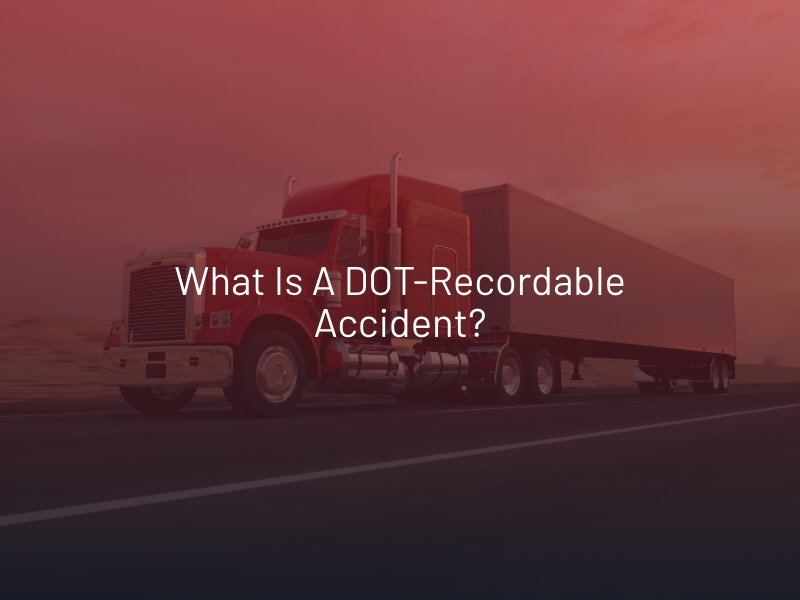What Is a DOT-Recordable Accident?
The Federal Motor Carrier Safety Administration (FMCSA) operates under the Department of Transportation (DOT) to monitor the transportation industry (e.g., large trucks, buses, etc.) and establish best practices to avoid crashes. However, the DOT cannot keep track of every fender bender. That’s why there is criteria an accident must meet for it to be considered a DOT-recordable accident.

Criteria for a DOT-Recordable Accident
The FMCSA defines a DOT-recordable accident as an occurrence involving a commercial motor vehicle in interstate or intrastate commerce in which:
- A vehicle had to be towed from the scene
- A fatality occurred
- A person was injured and required immediate medical treatment away from the accident scene
Which party was at fault for causing the accident is not considered when determining whether an accident is a DOT-recordable event. Each time a collision meets the criteria, the accident register and copies of accident reports must be kept on hand for three years.
Why Whether an Accident is DOT-Recordable is Important
The FMCSA uses a point system similar to the one used by the state DMV to hold transportation companies and their drivers accountable for serious accidents. Each time a DOT-recordable accident occurs, it affects carrier safety records, and the data is used to determine safety ratings for transportation companies. The FMCSA multiplies the number of DOT-recordable accidents a motor carrier has had by one million, then divides it by the number of miles the motor carrier has driven in the past year. That number is the carrier’s safety rating.
A safety rating of more than 1.5 accidents per one million miles results in an “unsatisfactory” rating. However, this rating is just one of six factors used to determine a carrier’s Safety Fitness Determination (SFD). If a carrier does wind up with an overall “unsatisfactory” SFD, they must take corrective actions or may face severe penalties. For example, the inability to transport hazardous materials or carry more than 15 passengers. The carrier will be allowed a 45-day window to correct any issues before the rating becomes official.
How Do DOT-Recordable Accidents Get Reported?
Motor Carriers are required to keep an accident register that contains the following information on each DOT-recordable collision:
- The date of the accident
- The city or nearest city, and state where the accident took place
- The name of the driver of the commercial vehicle
- The number of injuries
- The number of fatalities
- Whether the accident caused a release of any type of hazardous materials (excluding the commercial motor vehicle’s fuel)
- Copies of all accident reports
This information must be kept on hand for three years for any FMCSA agent, a representative from an authorized state or local enforcement agency, or an authorized third party to review. The FMCSA also requires carriers to comply with any investigation into these records.
DOT-recordable accident information and a carrier’s safety rating can be critical evidence of a history of negligence. If you or a loved one has been involved in a serious collision, a Las Vegas truck accident lawyer may be able to use this data when building your case against a truck driver or the trucking company.